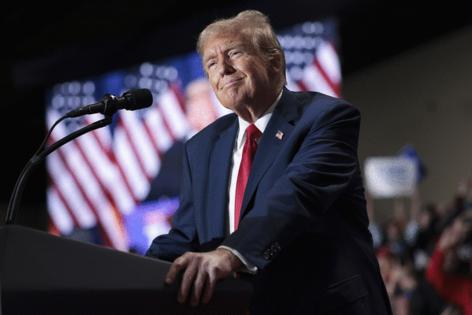What Supreme Court immunity decision means for Fulton County Trump case
Published in News & Features
ATLANTA — The Supreme Court’s blockbuster decision on Monday that determined former President Donald Trump is partially immune from prosecution is expected to reshape — but not sink — the criminal case against him in Fulton County.
In a 6-3 decision that broke largely along ideological lines, the high court ruled that presidents have “absolute immunity” for their official acts. But Chief Justice John Roberts, who authored the historic majority ruling, also concluded “there is no immunity for unofficial acts.”
“The President is not above the law,” the court’s conservative block ruled. “But under our system of separated powers, the President may not be prosecuted for exercising his core constitutional powers, and he is entitled to at least presumptive immunity from prosecution for his official acts.”
Fulton Superior Court Judge Scott McAfee will need to determine which of the 10 felony counts against Trump can pass muster under the high court’s decision. The question: was Trump’s conduct — such as a January 2021 phone call to Georgia Secretary of State Brad Raffensperger — official or unofficial.
“This does have some very deep implications for what (Fulton County District Attorney) Fani Willis is trying to do here,” Georgia State University law professor Anthony Michael Kreis said on The Atlanta Journal-Constitution’s “Politically Georgia” podcast.
Among the decisions McAfee will need to make is whether Trump’s interactions with Raffensperger and other state officials, including Gov. Brian Kemp, the late House Speaker David Ralston and others, fell under his “official” duties as president and thus must be dropped from the indictment or whether they constitute an “unofficial,” or prosecutable, act.
Many of the charges in Fulton County are built upon Trump’s actions as a candidate, which seems to fall under the umbrella of private conduct.
For example, Kreis said that based on the decision, those conversations with state officials would “seemingly fall out of the immunity sphere and therefore would be subject to prosecution.”
Similarly, McAfee will need to determine whether Trump’s attempts to pressure his vice president, Mike Pence, to question the election results from swing states such as Georgia were considered part of his official duties. A significant part of the Fulton case focuses on the effort to appoint a slate of Trump electors in the event that Pence struck down the official Democratic electors.
A spokeswoman for the Fulton DA’s office declined to comment.
...continued
©2024 The Atlanta Journal-Constitution. Visit at ajc.com. Distributed by Tribune Content Agency, LLC.







Comments